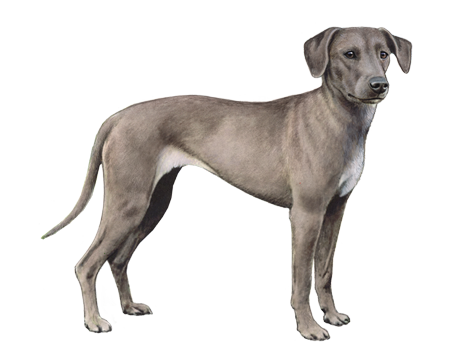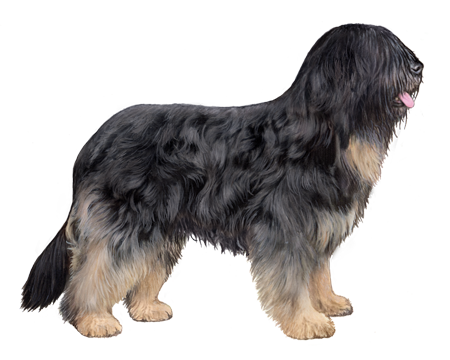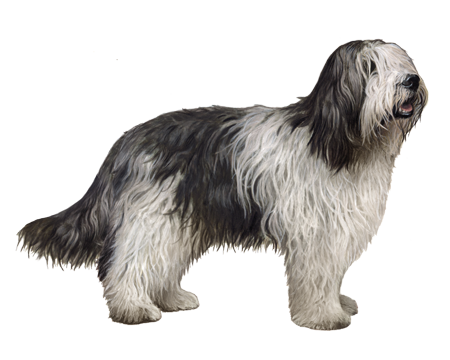
Chinook
The Chinook is not just smart, patient, and devoted; these dogs were, at one time, the rarest dog breed in the world, which is surprising given their calm, affectionate disposition, and love for children.
Interested in discovering if your dog is a Chinook?
Check out Wisdom Panel's DNA tests.

Chinook Traits
General Appearance
The Chinook is an athletic, hard-bodied dog that moves with speed and grace.
Coat and Colouring
Chinooks are a double-coated breed. Their short, dense undercoats have a down-like texture that provides much-needed insulation in extreme temperatures. Their outercoats are straight, short, and coarse with hair that is longer on the ruff, shoulder blades, withers, breeches, and underside of the tail.
Seasonal changes to their coats occur: Chinooks have soft, plush outercoats with coarser hair following the topline in the winter and thinner coats that are coarse all over in the summer.
Chinooks are a tan color with shades ranging from honey to reddish-gold. The ears and muzzle should be darker than their bodies with black shading preferred. Symmetrical markings in white, cream, or pale gold are allowed on the cheeks, throat, chest, breeches, and underside—but the breed standard doesn't allow any other white markings.
Distinctive Physical Traits
Chinooks are powerful dogs with straight, strong, level backs, broad chests, and muscular hindquarters. They have tight, oval-shaped feet with thick, tough pads.
Their tails are broad at the base, taper at the end, and have distinct but moderate fringing. Chinooks also have medium-sized, almond-shaped eyes with black rims that convey an intelligent, inquisitive, kind expression.
Chinook Temperament
For all their strength and agility as sled dogs, Chinooks also know how to play. They are affectionate family companions that adore being part of a pack, especially one that includes children. Chinooks are eager to please and will settle right in with families.
Thanks to their calm, sweet-natured personalities and strong work ethics, Chinooks have been trained for as search and rescue and therapy dogs. A Chinook won't make a good guard dog because of its friendly and easygoing nature.


Chinook History
In 1896, American adventurer Arthur Treadwell Walden explored the wilds of Alaska as a sled dog driver. He returned to his New Hampshire home eager to develop a unique sled dog breed; there, he crossbred Huskies with a mastiff-type dog to create the Chinook, a breed he named after the lead dog on his sled dog team.
The Chinook became well known among mushers, but the dogs, prized as much for their sledding abilities as their outgoing, affectionate personalities, fell out of favor when Siberian Huskies became the go-to sled dog breed. After Walden died in 1947, the breed started dying out, too. In 1965, with just 125 known Chinook remaining, the Guinness Book of World Records listed the Chinook as the rarest dog breed.
Breed enthusiasts sought to bolster the population (and popularity) of the breed and successfully helped bring the Chinook back from the brink of extinction. Today, it’s the official state dog of New Hampshire.
Chinook Care
Nutrition
Feed Chinooks a high-quality dog food that is appropriate for their life stage (puppy, adult, senior). Consider a diet formulated for active breeds. Portion out their food with a measuring cup and limit treats to no more than 10 percent of their daily calories to avoid overfeeding Chinooks.
Grooming
When it comes to grooming, Chinooks are low maintenance. Brush their double coats at least once per week—more often during seasonal shedding events—to remove dead hair. A pin brush or slicker brush can help reduce shedding.
Chinooks also require regular ear cleanings, nail trims, and a dental care routine that includes at-home teeth brushing and professional cleanings. Start these grooming essentials when Chinooks are puppies to ensure they are part of their routine.
Exercise
Chinooks are sled dogs that love to be on the move; walks, hikes, bike rides, or swimming will help them burn energy. Thanks to their intelligence and high energy, Chinooks also excel at dog sports such as sledding and skijouring (pulling a person on skis) and activities like obedience, agility, rally, and tracking.
Training
These are intelligent, eager to please dogs that take to training quickly. A consistent training routine that incorporates positive reinforcement and rewards will teach Chinooks basic commands and good manners.
Socialization is important, too. Chinooks are social dogs that will love opportunities to meet new people and pets and explore new places.

Chinook Genetic Health Conditions
-
Chondrodysplasia (Discovered in Norwegian Elkhound and Karelian Bear Dog)
Chondrodysplasia is a skeletal disorder that leads to the development of shorter than normal legs.
-
Chondrodystrophy (CDDY) and Intervertebral Disc Disease (IVDD) Risk
Chondrodystrophy (CDDY) is a skeletal disorder characterized by shortened limbs and abnormal early degeneration of the spinal discs, or intervertebral disc disease (IVDD), which predisposes to disc herniation.
-
MDR1 Medication Sensitivity
The MDR1 gene variant causes a defect to a drug pumping protein that plays an important role in limiting drug absorption and distribution (particularly to the brain). Dogs with the MDR1 variant may have severe adverse reactions to some commonly used medications.
Knowing if your Chinook is a carrier or at-risk for these conditions can help you and your veterinarian plan for your pup's lifelong care. With Wisdom Panel™ Premium, you can get results for over 200 genetic health tests.
Breed Group
Herding
The herding group is a diverse category. These highly intelligent breeds were developed to guard and control the movement of livestock.
Resources
https://www.akc.org/dog-breeds/chinook/
http://images.akc.org/pdf/breeds/standards/Chinook.pdf
Reviewed 26 July 2020 by Cindy Elston, DVM, MPH























































